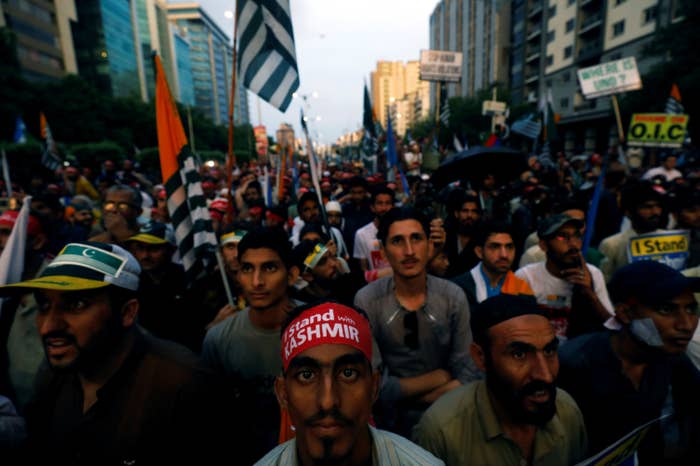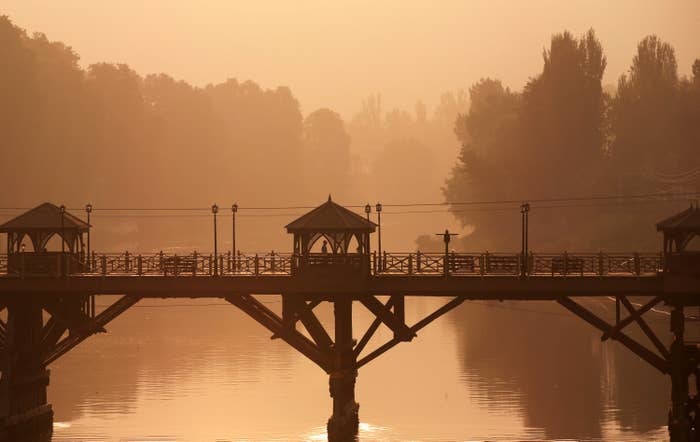
For 29 days, the residents of Kashmir, the conflict-ridden state in northern India, have been living in a black hole. On midnight, Aug. 4, India's Hindu nationalist government abruptly wiped out the legal autonomy that the disputed region has enjoyed for decades, and shut down the region’s internet.
It isn't the first time that internet services have been shut down in Kashmir. According to the Software Freedom and Law Centre, a New Delhi–based digital advocacy organization, this was the 55th internet shutdown in Kashmir in 2019 alone. But Kashmiris who spoke to BuzzFeed News said that the scale of this particular blackout was unprecedented — in addition to mobile internet services, landline and broadband services are frozen, and most local television channels have been turned off.
Four weeks into the blackout, life in Kashmir has come to a standstill, with pharmacies running out of essential medicines, newspapers unable to function, and strict curfews making it impossible to move around after dark. And the situation doesn’t seem to be improving: On Friday, India imposed fresh restrictions on Kashmir, telling people to stay off the streets.
To better understand what is happening to ordinary people, BuzzFeed News spoke to five Kashmiris who have been in and out of the region: a college student desperately trying to reach her parents, a restaurateur who turned his Instagram into a communications hub, a man desperately trying to ship medicine to his father-in-law, a startup founder cut off from the marketplace, and a college student trapped indoors.
Here are their stories.
Amirah, college student, New Delhi
I moved to New Delhi from Kashmir a month ago for an undergrad degree in political science. When the internet and telephone blackout happened, my mental health plummeted. I kept dialing phone numbers constantly, but I couldn't contact Mom and Dad in Kashmir. I don’t know if they are OK. The last time I spoke to my parents was five minutes before they shut down the phones and the internet in Kashmir on August 4. We knew something was going to happen, but nobody knew what. "Don't panic," my mom told me before she hung up.
In Kashmir, we're used to having the internet shut down frequently. But usually, it comes back in a few days, and the phones still work. For the first two days I held on. On the third day, I started panicking. I felt numb. I didn't go to college that day. Everybody around me who had families in Kashmir was freaking out too. We just kept talking to each other for emotional support.
I stayed in Kashmir for nine days before coming back to Delhi, and it was like living in a black hole. We weren't allowed to step outside our houses because there was a curfew. We had no contact with the outside world. At one point, the Indian military wouldn't even let us walk on the street immediately outside my house. We didn't know if people living across the street from us were OK. We didn't know whether our relatives who live around the Valley were OK. Eid was especially hard. It's our biggest festival and everyone usually visits each other's houses each year at this time, but this year, nobody did.
I think one of the worst parts of living through this blackout has been the way nationalist news channels in India have covered the situation in Kashmir by trying to portray it as normal. It's propaganda.
Javid Parsa, restaurateur, New Delhi
Kashmir is my home and it's in trouble. Why wouldn't I help my people? Dealing with medical emergencies seemed to be an obvious priority to try and help out with. I have a sizable following on Instagram, so I decided I could use it as a platform to help my people out.
The communications blackout has spawned a medical emergency in Kashmir. Each day, I get three or four people traveling to Kashmir messaging me and offering to carry and deliver medicines and other essentials to people's families who are stuck there unable to ask anyone for help. Just yesterday, we found five patients in Southern Kashmir who urgently needed blood pressure medication. Thanks to my Instagram, we were able to find a guy driving there from Delhi who was able to carry the medicines and deliver them. Unfortunately, thanks to the blackout, the people who do receive these medicines have no way of letting me know right now.
There have been a couple of times when I've had to buy medicines myself and hand them over to someone traveling to the region, but to be honest, given what's happening, it's not a big deal. If the internet and telephones continue to remain shut, however, and pharmacies and hospitals in Kashmir run out of medicines, we might need to find some way to connect the larger Kashmiri community working in Delhi and other cities in the country and raise donations to buy medicines for people there.
The most worrying part for me right now is how silent most people in the rest of the country are about the communications blackout in Kashmir. Human rights are being snatched away as we speak.

Zameer, marketer, Dubai
I live in Dubai, but my father-in-law, who has had chronic lymphocytic leukemia for the last six years, lives in Kashmir. It's a kind of blood cancer for which he needs specialized, expensive medication each month, without which he cannot survive.
So far, we've been paying a pharmacy in New Delhi, one of the few places in the country that actually stocks this medicine, to ship it to him in Kashmir, but ever since the internet and telephone blackout, they haven't been able to. He ran out of his last dose on August 8, three days after the blackout started. He's in no condition to travel to Delhi to get it.
Javid has been using his Instagram to help people with medical emergencies in the valley. He's also a friend from college. I was desperate, so I had the pharmacy ship my father-in-law's medication to him in New Delhi. And thanks to someone he found through Instagram, he was able to send it to my father-in-law's house. He missed his dose for more than 15 days, but he's gotten it now.
I feel extremely lucky, but my story is probably an exception. I don't know how many families out there have had to suffer because of the blackout. Every single one of them has a story to tell — if only they could talk to the world.
Sheikh Sami Ullah, startup founder, Srinagar
I'm the founder of a one-year-old startup that handles deliveries and shipment logistics for more than 200 artists in Kashmir who sell handicrafts on Instagram — and the blackout has not only frozen my business but also robbed them of their livelihoods.
Every month, we deliver more than 15,000 items across the country. Ever since the blackout started, we've delivered nothing. We earn around Rs. 20 lakhs (nearly $30,000) each month. This month, we've earned nothing.
I sunk every single penny I earned into this business, and I'm on the hook for a loan from a bank. I'm not sure how I'll pay it back if this blackout doesn't clear up — and right now, it's showing no sign of getting better. I think if this goes on for another month, I'm going to have to give up being an entrepreneur and find a job just to sustain myself and pay my loan.
I spent 15 days in Srinagar during the blackout and felt completely paralyzed, mentally and physically, because of the communications blackout and the strict curfews. When I came back to Delhi, it felt like I was in another world in another time.
I’m hoping. I’m praying. It’s all I can do right now.
Hadiya Ahmed, college student, Dubai
I'm a third-year psychology student in Dubai. My parents are Kashmiri and I go back once or twice a year.
I was there for a month before and two weeks after the blackout.
It was 11:05 p.m. on August 4 when they shut off the internet and 1:10 a.m. on August 5 when they turned off phone calls and SMS. I remember because I was on a call with someone who was supposed to fly out the next morning, and then it snapped off. It felt kind of normal, because it wasn't the first time they did it. We thought it would be for a day or two, but it went on. I never found out if my friend made it out or not.
With no stepping out of the house, it felt like solitary confinement. I was this close to losing my mind. I mean, it's 2019. How can you survive without phone calls and the internet?
Losing Kashmir’s autonomy broke my heart. I had a lot of anxiety and panic attacks and I barely ate anything for a week. Nobody celebrated Eid because nobody felt like it.
On the third day, it stopped feeling "normal." I tried to read books, but I couldn't. I thought I could tolerate it, but not having anybody to talk about it with makes you feel like standing on top of the world and screaming and telling people that you're dying.
Eventually, our television turned off too, because there wasn't any way to pay the bill online. It was seven of us in one house — my granddad, uncle, his wife, and three kids. The kids went mad. The youngest is 11 and usually spends most of her time watching YouTube videos. The 16-year-old usually plays PUBG and Minecraft a lot, and the eldest, who is 20, is always on social media and watches a ton of movies and TV online, and they couldn't do anything.
The worst part of having the landline phones disconnected was that it cut us off completely from older relatives like my maternal grandmother who lives by herself. We worried about her constantly and didn't really have a way to check on her. Eventually, to visit her, we would leave the house at 4 a.m. to visit her to avoid the Indian army's curfews on the roads.
I stayed in the blackout for more than two weeks, and I was lucky I could go back to Dubai after that. I didn't want to leave. I didn't want to leave my family like that. The privilege of being able to move out felt unfair.
CORRECTION
The Indian government hasn't banned journalists from visiting Kashmir. An earlier version of this story misstated that.
